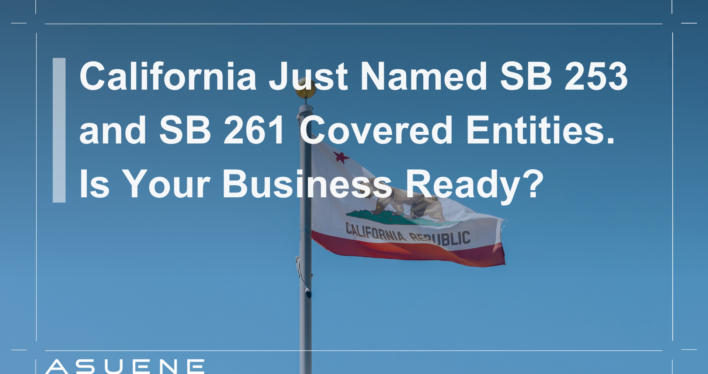- Article Summary
-
Introduction
In September 2025, the California Air Resources Board (CARB) published the preliminary list of companies that must comply with California’s landmark climate disclosure laws: Senate Bill 253, the Climate Corporate Data Accountability Act, and Senate Bill 261, the Climate-Related Financial Risk Disclosure Program. This is the moment businesses have been anticipating since the bills were signed into law in 2023. With the release of the list, the question is no longer theoretical. Companies can now see whether they are captured by California’s climate accountability regime and what that means for their operations, reporting, and reputation.
These laws represent a turning point in corporate climate accountability. They push climate disclosure from the realm of voluntary frameworks like CDP or TCFD into mandatory regulation, requiring both greenhouse gas emissions reporting and financial risk disclosure. The challenge for businesses is clear: adapt quickly or risk falling behind regulatory and market expectations.
Who Is on the Preliminary List
CARB’s list confirms the sweeping scope of SB 253 and SB 261. Companies are included if they meet the following criteria:
- SB 253 (Climate Corporate Data Accountability Act): Companies with more than $1 billion in annual revenue doing business in California.
- SB 261 (Climate-Related Financial Risk Disclosure Program): Companies with more than $500 million in annual revenue doing business in California.
Both public and private entities are covered. Importantly, this is not limited to California-headquartered firms. Out-of-state and multinational companies are also captured if they cross the revenue thresholds and meet California’s definition of “doing business in the state,” which CARB has tied to established tax code standards.
Key sectors identified in the preliminary list include:
- Energy and utilities
- Transportation and logistics
- Consumer goods and retail
- Financial services
- Technology and data centers
- Healthcare and pharmaceuticals
This sector diversity highlights the broad reach of the disclosure laws. Even companies without large physical footprints in California may find themselves included due to revenue thresholds and interstate commerce.

What Compliance Will Require
The obligations under SB 253 and SB 261 are both ambitious and detailed:
- Greenhouse Gas Emissions Disclosure (SB 253):
- Initial Scope 1 and Scope 2 emissions reporting in 2026, covering the prior fiscal year.
- Scope 3 emissions reporting begins in 2027, also covering the prior fiscal year.
- All disclosures must be independently verified by third-party assurance providers.
- Climate-Related Financial Risk Reporting (SB 261):
- Initial reports due January 1, 2026.
- Companies must assess and disclose material climate-related financial risks, in alignment with frameworks such as TCFD.
- Reports must describe how these risks are identified, managed, and integrated into business strategy.
Compliance requires tight coordination between sustainability and finance teams, robust data systems, and external assurance partners. Many companies will need to expand existing reporting infrastructure, integrate emissions tracking into enterprise risk management, and elevate climate oversight to the board level.
Table: Compliance Requirements at a Glance
| Requirement | SB 253 | SB 261 |
|---|---|---|
| Revenue threshold | $1 billion+ | $500 million+ |
| Entities covered | Public & private doing business in CA | Public & private doing business in CA |
| Initial reporting year | 2026 (Scopes 1 & 2) | 2026 (financial risk) |
| Scope 3 emissions | 2027 reporting year | Not required |
| Verification | Third-party assurance required | Not required, but expected to align TCFD |
What Comes Next
The release of the preliminary list marks the start of a longer compliance journey. CARB will refine its regulatory definitions of “doing business,” finalize reporting timelines, and issue further guidance in the months ahead. But companies cannot afford to wait. The deadlines are approaching fast:
- January 1, 2026: First climate-related financial risk reports due under SB 261.
- 2026 (date TBD by CARB): First Scope 1 and 2 emissions disclosures due under SB 253.
- 2027: Scope 3 emissions disclosure requirements take effect.
Companies that delay preparation risk regulatory penalties, reputational damage, and heightened investor scrutiny. Conversely, early movers will gain a strategic advantage, demonstrating credibility and building trust with stakeholders.
Key actions businesses should take now:
- Launch or accelerate a full greenhouse gas inventory across operations and supply chains.
- Select and engage qualified assurance providers.
- Align financial disclosures with climate risk frameworks such as TCFD.
- Build internal governance and reporting processes that integrate sustainability and finance.
California’s disclosure mandates also align closely with emerging global standards, including the SEC’s forthcoming climate disclosure rule and the EU’s Corporate Sustainability Reporting Directive (CSRD). For multinationals, this means compliance planning in California can serve as a foundation for global disclosure readiness.
Download Our Whitepapers
For a deeper dive into compliance strategies and emerging disclosure trends, explore our whitepapers:
- California’s New Climate Disclosure Laws / 10 Pioneer Initiatives by US Businesses, States and Cities
- TCFD Framework: Key Processes and Considerations at Each Stage
- U.S. State Disclosure Regulation 2025 – CA, NY and IL
These resources provide timelines, reporting strategies, and practical checklists to help your business stay ahead of California’s climate accountability rules and prepare for the next era of corporate disclosure.
Why Work with ASUENE Inc.?
ASUENE is a key player in carbon accounting, offering a comprehensive platform that measures, reduces, and reports emissions. ASUENE serves over 10,000 clients worldwide, providing an all-in-one solution that integrates GHG accounting, ESG supply chain management, a Carbon Credit exchange platform, and third-party verification.
ASUENE supports companies in achieving net-zero goals through advanced technology, consulting services, and an extensive network.


